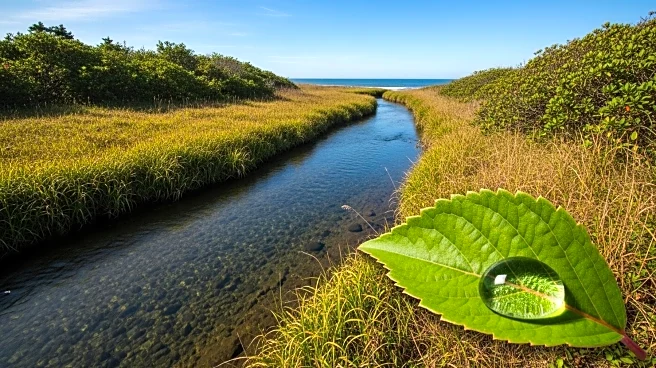What is the story about?
What's Happening?
A groundbreaking scientific expedition, known as Expedition 501, has uncovered a massive hidden aquifer of fresh water beneath the ocean floor off Cape Cod. This discovery was made by drilling into the seabed, revealing a potential fresh water source that stretches from New Jersey to Maine. The expedition, backed by the U.S. National Science Foundation and the European Consortium for Ocean Research Drilling, aims to address the looming global water crisis, as the United Nations predicts that fresh water demand will exceed supply by 40% within five years. The research team, led by geophysicist Brandon Dugan, is analyzing thousands of samples to understand the origins and potential uses of this water, which could be crucial for future water supply solutions.
Why It's Important?
The discovery of fresh water beneath the ocean floor near Cape Cod is significant as it offers a potential solution to the global water shortage crisis. With rising sea levels and increasing water consumption by data centers, fresh water sources are becoming scarce. This hidden aquifer could provide a sustainable water supply for large populations, potentially meeting the needs of a city the size of New York for centuries. However, challenges remain in extracting and managing this resource without harming the environment. The findings could influence future water management policies and encourage further exploration of undersea aquifers worldwide.
What's Next?
The next steps involve extensive laboratory analysis to determine the age and origin of the water, which will help assess its sustainability as a resource. Scientists will also explore the ecological impact of extracting this water and address legal and ownership issues. The expedition's findings will be shared in a collaborative research session in Germany, aiming to produce initial results that could guide future water resource management strategies. Policymakers and conservationists will need to consider the implications of tapping into undersea aquifers, balancing the benefits against potential environmental risks.
Beyond the Headlines
The discovery raises ethical and environmental questions about the exploitation of undersea resources. Extracting fresh water from these aquifers could disrupt marine ecosystems and affect nutrient supplies vital to ocean life. Additionally, the potential commercialization of this resource poses challenges in terms of ownership and equitable distribution. The research underscores the need for sustainable practices and international cooperation in managing global water resources, highlighting the delicate balance between technological advancement and environmental preservation.
















